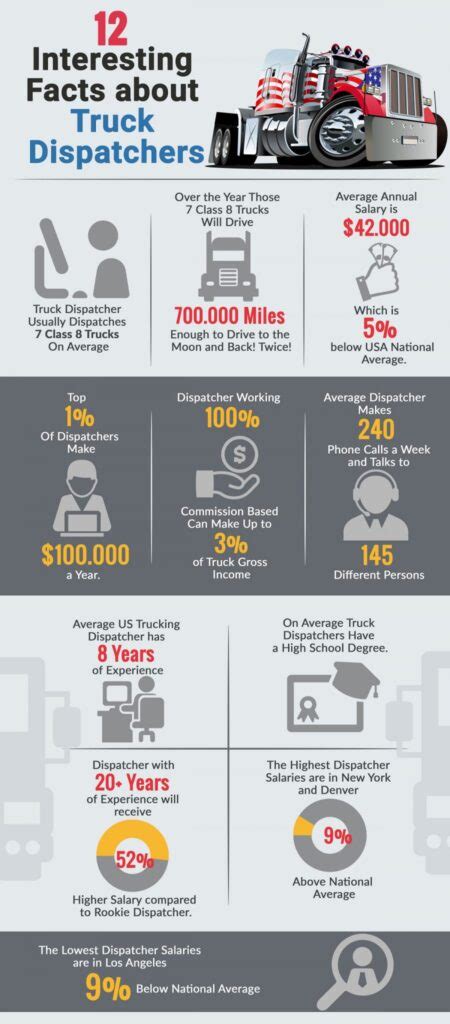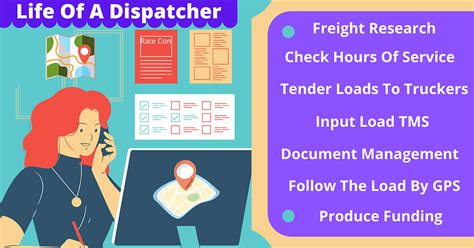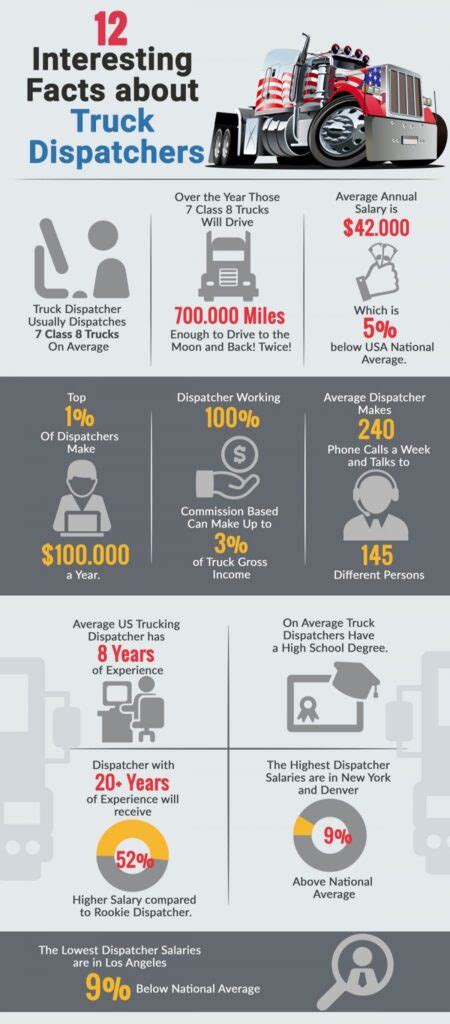How Much Do Truck Dispatchers Make Per Load

Welcome to an in-depth exploration of the lucrative world of truck dispatching, where we delve into the intricacies of earnings and provide a comprehensive understanding of how much dispatchers can make per load. This article aims to shed light on the financial aspects of this vital role in the transportation industry, offering valuable insights for aspiring dispatchers and those curious about the industry's economic dynamics.
Understanding the Role of a Truck Dispatcher

A truck dispatcher serves as the vital link between truck drivers and the clients or companies they work for. Their primary responsibilities include planning and coordinating routes, ensuring timely deliveries, and effectively managing a fleet of trucks. This role demands a unique blend of organizational skills, knowledge of transportation regulations, and an understanding of logistics to guarantee smooth operations.
The earnings of a truck dispatcher are often tied to the loads they successfully dispatch, making it a performance-based profession. The income can vary significantly depending on various factors, including the type of cargo, distance traveled, and the dispatcher's negotiation skills.
Factors Influencing Truck Dispatcher Earnings

Type of Cargo and Distance
The nature of the cargo and the distance it needs to be transported play a pivotal role in determining the earnings of a truck dispatcher. Specialized cargo, such as hazardous materials or temperature-controlled goods, often fetches higher rates due to the added complexity and responsibility involved.
Similarly, long-haul routes typically command higher pay than shorter, local deliveries. The reason behind this is the increased time commitment, fuel costs, and potential for unforeseen challenges associated with longer journeys.
| Cargo Type | Average Earnings per Load |
|---|---|
| General Freight | $2,000 - $3,000 |
| Hazardous Materials | $3,500 - $5,000 |
| Temperature-Controlled Goods | $3,000 - $4,500 |

Negotiation Skills and Experience
The art of negotiation is a critical skill for truck dispatchers. Their ability to strike favorable deals with clients and carriers can significantly impact their earnings. Experienced dispatchers, with a proven track record of successful negotiations, often command higher rates and have more leverage in the market.
Furthermore, building strong relationships with carriers and understanding their needs can lead to repeat business and potentially higher earnings over time.
Market Demand and Seasonality
The transportation industry is subject to market fluctuations and seasonal demands. During peak seasons, such as the holiday rush or agricultural harvests, the demand for truck transportation surges, often resulting in higher pay for dispatchers. Conversely, during slower periods, rates may drop, affecting dispatcher earnings.
The Average Earnings of a Truck Dispatcher
According to industry reports and surveys, the average earnings of a truck dispatcher can range from 50,000 to 75,000 per year. However, it’s essential to note that these figures are just estimates and can vary significantly based on the factors mentioned earlier.
Some dispatchers, especially those with a proven track record of success and a solid network of carriers, can earn well above the average. Their expertise in negotiating rates, managing complex logistics, and ensuring timely deliveries can lead to substantial financial rewards.
Real-Life Examples of Dispatcher Earnings
To provide a clearer picture, let’s look at some real-life scenarios:
- Dispatcher A: With over a decade of experience, Dispatcher A specializes in coordinating hazardous material shipments. On average, they dispatch two to three loads per week, earning approximately $4,000 to $5,000 per load. This results in an annual income of around $200,000 - $250,000.
- Dispatcher B: A recent entrant to the industry, Dispatcher B primarily handles general freight for local deliveries. Dispatching 4-5 loads per week, they earn an average of $2,500 per load, resulting in an annual income of approximately $60,000.
- Dispatcher C: Working for a large transportation company, Dispatcher C manages a diverse fleet of trucks. Their earnings are commission-based, with an average of $3,000 per load. With consistent performance, they dispatch 6-7 loads per week, earning an annual income of around $150,000.
Strategies to Maximize Earnings
Building a Strong Network
One of the most effective ways for truck dispatchers to maximize their earnings is by building a robust network of carriers and clients. This network can provide access to a wider range of loads, increasing the potential for higher-paying jobs.
Additionally, a solid network can offer stability, ensuring a steady flow of work even during slower periods.
Staying Updated with Industry Trends
The transportation industry is constantly evolving, with new technologies and regulations shaping the landscape. Dispatchers who stay abreast of these changes can adapt their strategies, ensuring they remain competitive and can offer efficient solutions to their clients.
Negotiation Techniques
Mastering the art of negotiation is crucial for truck dispatchers. Developing a keen understanding of market rates, carrier needs, and client expectations can position dispatchers to negotiate more favorable terms. This includes knowing when to accept a lower rate to secure a job and when to hold out for a higher one.
Future Outlook and Industry Growth

The transportation industry, including truck dispatching, is poised for significant growth in the coming years. With the global economy expanding and the increasing demand for goods transportation, the role of dispatchers is set to become even more crucial.
The adoption of new technologies, such as GPS tracking and real-time data analytics, will further enhance the efficiency and effectiveness of dispatching operations, potentially increasing dispatcher earnings and career opportunities.
Emerging Trends in Truck Dispatching
- Technology Integration: The integration of advanced technologies is revolutionizing the industry. Dispatchers can now leverage data-driven insights to optimize routes, predict demand, and improve overall operational efficiency.
- Sustainable Transportation: With a growing focus on environmental sustainability, the industry is witnessing a shift towards greener transportation solutions. Dispatchers who specialize in coordinating sustainable freight movements may find increased demand for their services.
- International Logistics: As global trade expands, truck dispatchers with expertise in international logistics will be in high demand. Managing cross-border transportation requires a unique skill set, offering opportunities for specialized dispatchers.
Conclusion
The role of a truck dispatcher is multifaceted and offers significant financial rewards for those who excel in the field. By understanding the key factors influencing earnings, dispatchers can strategize to maximize their income potential. With the industry’s growth trajectory and the evolving role of technology, the future looks bright for truck dispatchers, presenting exciting opportunities for career advancement and financial success.
How does a truck dispatcher’s income compare to that of a truck driver?
+Truck dispatchers and drivers operate in different roles, each with its own set of responsibilities and earning potential. While drivers are compensated based on miles driven or hours worked, dispatchers earn through a commission or salary structure, often tied to the loads they dispatch. On average, dispatchers can earn more than drivers, especially those with specialized skills and strong negotiation abilities.
Are there any certification programs or courses that can enhance a dispatcher’s earning potential?
+Yes, several industry-recognized certification programs and courses can enhance a dispatcher’s skills and earning potential. These include the Certified Transportation Broker (CTB) certification, offered by the Transportation Intermediaries Association (TIA), and various logistics and supply chain management courses. Such certifications demonstrate a dispatcher’s expertise and can open doors to higher-paying opportunities.
What are the career progression opportunities for truck dispatchers?
+Truck dispatchers can advance their careers through various paths. With experience and a strong track record, they can move into managerial roles, overseeing a team of dispatchers. Some dispatchers choose to specialize in a particular industry or cargo type, offering their expertise as consultants. Others may decide to start their own dispatching or transportation brokerage businesses, leveraging their industry knowledge and connections.



